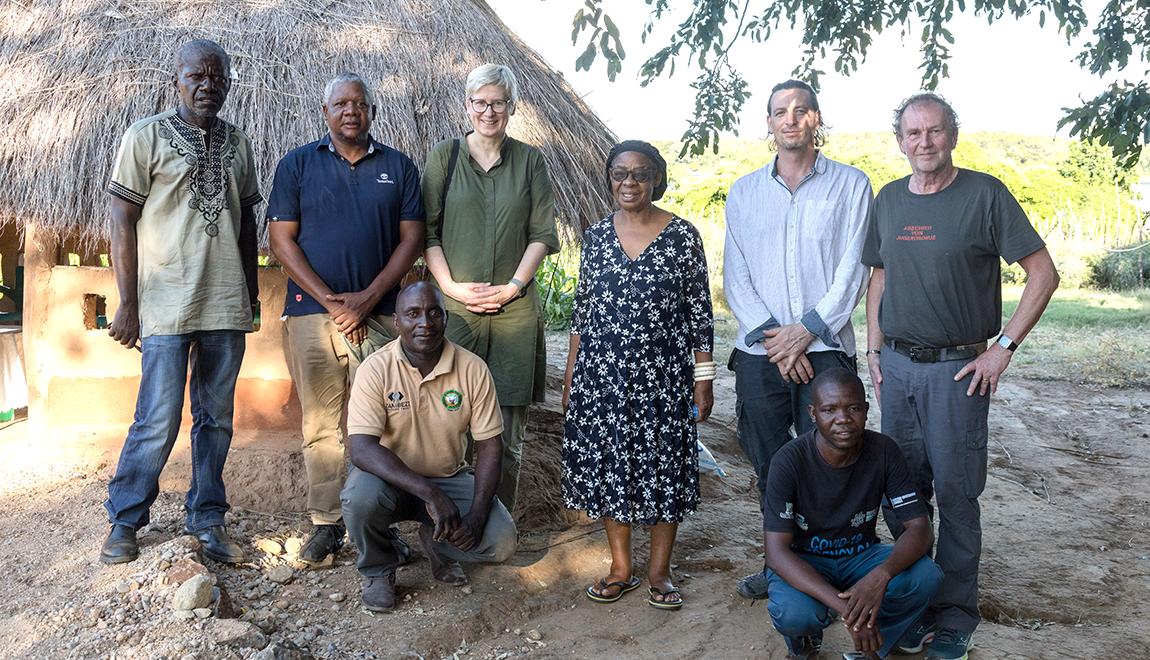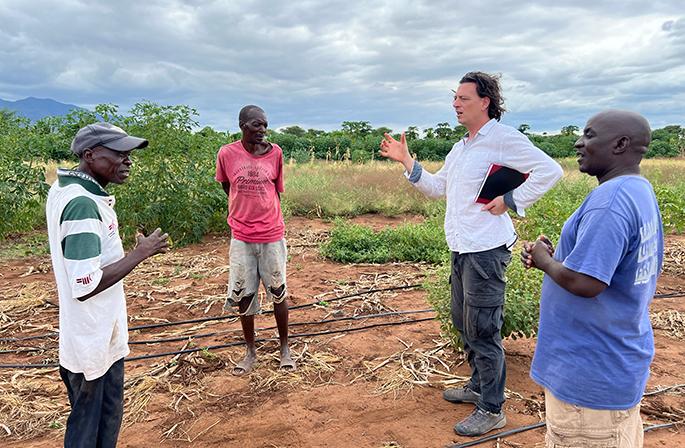THE HASSELMANN PROJECT: THE CLIMATE VILLAGE LAB IN ZAMBIA
The Hasselmann Project, launched under the name Climate Village Lab, is a pioneering initiative led by the German NGO “GEO schützt den Regenwald” (GEOsdR). Officially launched in June 2025, the five-year pilot is being implemented in three rural communities in Zambia to reduce CO₂ emissions, preserve biodiversity, and promote a sustainable development model that can be replicated and adapted worldwide. The project was made possible by a generous donation from Professor Dr Klaus Hasselmann, Nobel Prize Laureate in Physics (2021), who contributed nearly all his prize money to GEOsdR to support climate action on the ground.
A cross-cutting approach to removals, mitigation, and adaptation
The Climate Village Lab stands out for its integrated, cross-cutting approach to climate action. At its core, the project prioritises removals - activities that actively draw greenhouse gases out of the atmosphere, such as agroforestry, assisted natural regeneration, forest conservation, and soil carbon storage. This focus on removals is complemented by interventions that simultaneously address climate change mitigation (reducing and removing GHG emissions) and adaptation (building resilience in vulnerable rural communities). By linking climate mitigation and adaptation with biodiversity conservation, the project ensures that emission reductions and ecosystem preservation are mutually reinforcing rather than isolated objectives.
The initiative combines off-grid technologies - including solar panels, batteries, electric fencing, and water pumps - with sustainable land-use practices such as agroforestry and efficient irrigation. These efforts are unified by an innovative incentive system known as proxy payments, which simulates income from future carbon and biodiversity credits and channels it into a community-managed fund. This model is designed to generate both climate impact and long-term socio-economic benefits for participating villages.
Who Is Professor Klaus Hasselmann?
Professor Klaus Hasselmann is globally recognised as a foundational figure in modern climate science. Awarded the 2021 Nobel Prize in Physics for his groundbreaking work linking chaotic weather patterns with long-term climate dynamics, Hasselmann’s contributions have shaped the scientific tools used to understand and model climate change today. His research demonstrated how human-induced emissions could be identified amid natural variability - a key insight that underpins much of today’s climate attribution research and policy frameworks. His notable donation to GEOsdR enabled the launch of the Climate Village Lab, translating scientific achievement into direct, on-the-ground climate action.
A climate and development blueprint
The project is equally ambitious in its commitment to improving local livelihoods. Most families in rural Zambia currently rely on subsistence farming and charcoal production - a practice that degrades forests and yields limited income. As soil fertility declines, rains become increasingly erratic, and the demand for charcoal continues to drive forest loss, the Climate Village Lab aims to work with communities to strengthen - not replace - their connection to the land by offering more sustainable and secure pathways forward.
Instead of one-off interventions, the project, implemented in the villages of Mugurameno, Chimusabo, and Kamambo in Zambia’s Chiawa region, brings together a range of practical activities: protecting remaining forests, allowing nature to regenerate, improving water use through drip irrigation, fencing communal farming areas, introducing agroforestry, and expanding access to solar-powered electricity. These measures are not just about infrastructure - they’re about restoring balance. For example, efforts to reduce conflict between people and wildlife mean safer nights for families and more secure harvests. Climate-resilient crops help farmers adapt to unreliable rainfall while offering opportunities to grow surplus food or sell high-value produce at local markets.
By supporting communities in identifying and managing their priorities, the project aims to create the conditions for more stable and diversified livelihoods. The goal is not only to support immediate improvements in household well-being but also to build a foundation for longer-term resilience in the face of climate change. Furthermore, the Climate Village Lab is designed to test innovative mechanisms such as biodiversity certificates and results-based payments. Participants receive compensation through a “Climate Village Fund” for successful restoration and conservation actions. Managed by local committees, this fund can be reinvested into community priorities such as microenterprises, education, or infrastructure, helping to create a revolving model of development that extends beyond the life of the project.
Before the project began, a typical household earned about $536 from farming and charcoal production each year - a total of $5,363 over ten years. With the project in place, families no longer rely on charcoal and instead benefit from new income sources such as community farming, agroforestry, and conservation payments. As a result, annual household earnings rise from $790 in the first year to $3,610 by year ten, with cumulative income reaching $22,000 over the decade. This represents a 310 per cent increase compared with previous practices, amounting to an additional $16,637 per household.
These improvements are made possible by a total investment of $1.34 million in the project. Alongside higher incomes and better livelihoods, the initiative is expected to cut CO₂ emissions by more than 92,000 tonnes over the 10-year period, showing that sustainable development can bring meaningful gains for both local communities and the environment.
Donors and implementation
The Climate Village Lab is funded through a consortium of philanthropic donors, beginning with Professor Hasselmann’s Nobel Prize donation. It has since gained support from the KfW Stiftung, Alexander Gruner Stiftung, Klaus-Friedrich Stiftung, and private-sector partners such as LichtBlick and energy expert Heiko von Tschischwitz. GEOsdR plays a leading role in coordinating financial resources and strategic direction, ensuring that the project remains anchored in both scientific rigour and social equity.
Local implementation is carried out by Conservation Lower Zambezi (CLZ), an experienced Zambian NGO that co-manages the Lower Zambezi National Park and works closely with nearby communities. CLZ leads village engagement and day-to-day coordination, with a strong background in conservation and conflict resolution between humans and wildlife.
GFA Consulting Group’s role
A central pillar of the project is the technical expertise provided by GFA Consulting Group. Beginning in 2024, GFA conducted a detailed pre-feasibility study to assess the environmental, social, and economic viability of the concept. This involved on-site research, household interviews, and community consultations that directly informed the project’s design.
GFA contributed a cross-sectoral perspective that helped integrate emission reductions with biodiversity and resilience goals. The team also aligned the initiative with Zambia’s evolving carbon market frameworks – particularly under Article 6 of the Paris Agreement – enabling future access to climate finance. GFA’s work in Zambia is also supported by the SPAR6C programme, which aims to enhance the government’s capacity to engage in international carbon trading. Joachim Schnurr, Director of GFA’s Climate Competence Centre, and Martin Burian, an environmental economist, have both played key roles in shaping the Climate Village Lab. Their local experience and technical acumen were vital in positioning Zambia as a pilot location and tailoring the model to fit both local needs and international requirements.
GFA Consulting Group delivered its services without applying overhead or administrative fees and provided key contributions under reduced-rate conditions. While technical experts were compensated, GFA’s broader support was offered on cost-effective terms, reflecting its practical approach to partnership and long-term engagement in climate and development projects.
The Hasselmann Project exemplifies a new paradigm in climate action, one that prioritises removals, integrates mitigation and adaptation, and places biodiversity conservation at its core. By providing economically viable alternatives to unsustainable practices, improving livelihoods, and testing innovative finance and governance models, the project delivers both environmental and socio-economic benefits. GFA Consulting Group has played a key role in the project’s technical development and implementation, ensuring that activities are grounded in both scientific frameworks and local priorities. Demonstrating how removals-focused, cross-cutting interventions can transform rural communities, the Climate Village Lab offers a replicable model with the potential to inspire similar initiatives worldwide.
> Online article about the project in the German publication "GEO" from 26 July, 2025 (German)





